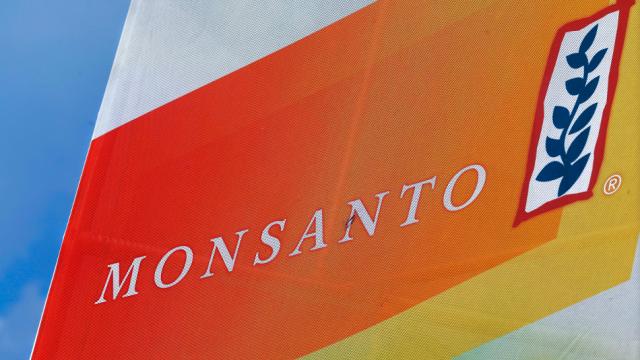Agriculture company Monsanto has acquired a non-exclusive global licensing agreement from MIT’s Broad Institute and Harvard to use the CRISPR/Cas9 gene-editing system. The firm will use it to design and grow new seeds and plants, but there are key restrictions on its use to prevent Monsanto from abusing this revolutionary new technology.
Image: Associated Press
Financial terms of the agreement were not disclosed, but you can bet it didn’t come cheap. The CRISPR/Cas9 genome-editing technology is revolutionising a number of fields, making it easier for geneticists to delete or add traits to an organism, whether it be a zebrafish, a retrovirus, collard greens or even a human.
CRISPR is fast and powerful, and in the hands of Monsanto, it will boost the company’s ability to create seeds and crops with desirable characteristics, such as drought and disease resistance, healthier fat content and added flavour. CRISPR may not be the first gene-editing tool made available to Monsanto, but it is the most powerful.
Monsanto, which was purchased by German drug and chemical maker Bayer for $US66 billion ($86.5 billion) last week, cannot use this technology in any way it sees fit. According to the terms of the new agreement, the company cannot conduct gene drives — a pending technique that would “push” a genetic characteristic through a wild population of animals, such as mosquitoes, frogs and weeds. A flawed and ill-thought out gene drive could result in unforeseen ecological consequences, which is why the practice remains so controversial.
The new agreement also stipulates that Monsanto cannot use CRISPR to create so-called “terminator” seeds, or genetic use restriction technology (GURT). This is the practice of creating sterile seeds, and many fear that Monsanto, which owns the patent to this technology, will someday opt to use it. By creating crops that can’t naturally self-replicate, and by making farmers dependent upon these seeds, agriculture firms like Monsanto stand to make tremendous profits. The new licence explicitly forbids this.
Finally, Monsanto cannot use CRISPR to do any work on tobacco that’s intended for smoking. That includes R&D to create tobacco plants that are more tolerant to temperature extremes and insects, or to increase crop yields.
It’s good to see that CRISPR’s patent holders are considering the ways in which their powerful new technology could be abused. What’s more, the new licence puts restrictions on a company that has a rather poor environmental and social track record, though more anti-Monsanto hysteria exists than is probably warranted.
The fact is, Monsanto, along with other agriculture firms, could use CRISPR to create some truly innovative crops. Last April, DuPont Pioneer announced that it’s going to use CRISPR to commercialize a next-gen version of waxy corn hybrids. Calyxt, a subsidiary of Cellectis, is using a different gene-editing tool, called TALENS, to decrease gluten in wheat crops, and to create soybeans that produce an oil much like olive oil.
Owing to a US Department of Agriculture loophole, many foods produced by CRISPR won’t require regulatory approval like GMOs do. This is because the technique does not involve the insertion of a foreign gene, and instead involves the deletion or modification of an existing one. These custom-designed food products could start to appear on store shelves fairly soon.
Gene-editing has the potential to bring even more worthwhile benefits. Given the worsening effects of global warming, our crops will increasingly have to withstand the effects of drought, heat and pests. And as our population increases, we’re going to have to find new ways to feed so people. It would behove us to get over this outdated and reactionary idea that all genetically modified crops are bad.
